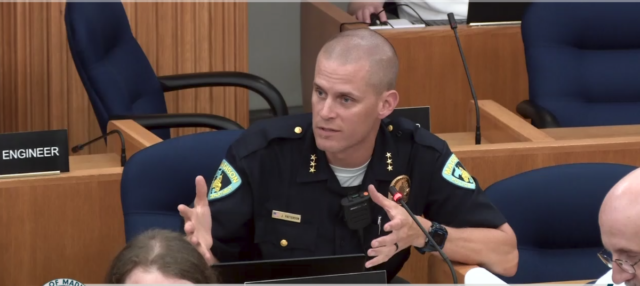The Madison Common Council moved to approve a contract that will keep police in schools on Tuesday night by a 15-4 vote with one abstention.. The vote ensures that school resource officers will remain in schools until June of 2022 when the contract would need to be renewed again.
The MMSD Board of Education, who last month voted 4-3 to move forward with the contract, has until September 15 of this year to request removing an officer from one of the four MMSD high schools for the 2020-21 school year. Under the agreement there will be quarterly meetings between the Madison Police Department and the school board to break down data and statistics of the SROs’ performance.
The idea of keeping police in schools has been the subject of controversy-filled school board meetings throughout the 2018-19 school year with organizations like Freedom Inc bringing youth and concerned parents to make public comments to the board opposed to the presence of police in schools. It was also a major topic in November’s school board elections. Two of the three people newly elected to the board in November voted against the SRO contract with the deciding vote being cast by former Deputy Mayor Gloria Reyes.
Discussion at City Council on Tuesday night lasted for well over an hour. Alder Tag Evers abstained from the vote citing his view that people have engaged in what he called fear mongering in order to keep police in schools.
“We cannot prevent an active shooter and that’s not why we have police in schools, so let’s not do that kind of fear mongering,” Evers said on the council floor. “The comments and the testimony from the folks at Freedom Inc are right on. Wisconsin has the worst graduation gaps, education gaps, achievement gaps in the country and it’s a lack of investment in the public health challenges that our kids, particularly our kids of color are facing. And to the extent that we in Madison tolerate this, we need to own it.”
But others, like Council President Shiva Bidar, did acknowledge the implicit racial and social issues permeating the topic of SRO’s while ultimately deciding to vote in favor of the contract. Bidar said that she would like to see the school board phase out the use of SRO’s and that, if she was on the school board, she likely would not have supported the contract.
“If I was on the school board my vote would be very different than my vote today,” Bidar said. “But I’m not on the school board. I don’t get to decide any of the activities that go on inside our schools. For me to be able to decide one piece of it I need to be able to have control over the other pieces of it. So for us to make a decision based on our substantive feelings and opinions about SROs but we don’t have control over all of the plans. So if we don’t have SROs what is the plan? What other services? What other support systems? What other funding is needed within our schools? We don’t have control over that the only control we have is to talk to our school board. I will be voting for this contract because it moves the ball forward. It actually has provisions and gives the ability to take one of the officers out of a school. It will move things forward to hopefully not having any SROs in schools. If we do not move forward there is no plan. I think we would not be doing a due diligence of work to not allow the school board to have a plan moving forward. I think we can all tonight verbalize to the school board the direction we would like them to go which is to hopefully phase out SROs.”
Assistant Chief of Police John Patterson said there were 39 arrests and 49 citations in the four MMSD High Schools this year. But that number did not include the number of incidents that did not rise to the level of arrest and an overwhelming majority of the arrests and citations involved Black and Brown students. Patterson was questioned intensely by members of the council about things like citations to kids who are late for school, truancy issues, the amount of time officers are engaged in actual law enforcement activities at school and was peppered with questions about how well-trained officers are as it relates to Restorative Justice.
Patterson said that if the contract had not been approved the officers who have been serving as SROs would have most likely been re-assigned to patrol.
Alders Rebecca Kemble, Marsha Rummel, Avra Reddy and Grant Foster voted against the SRO contract.


































